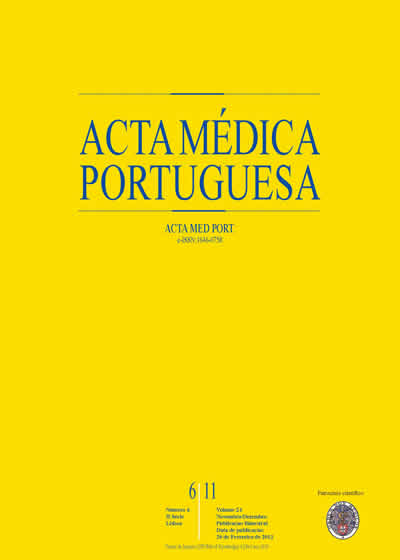Ehlers-Danlos syndrome type IV in association with a (c.970G>A) mutation in the COL3A1 gene.
DOI:
https://doi.org/10.20344/amp.1405Abstract
The Ehlers-Danlos syndrome type IV (EDS-IV) is a hereditary, autosomal dominant disease that causes a defect in the procollagen III synthesis, which results in a structural modification in this protein. An awareness of the disease is of vital importance for the optimal outcome, since the affected individuals have a high risk of vascular, intestinal and uterine rupture. It's a disease with great clinical variability and the diagnosis is confirmed by detection of a mutation in the gene encoding collagen type III. The authors present a case report of a patient who appeared at the emergency ward with acute abdomen and hypovolemic shock after spontaneous aortic rupture. The diagnosis was confirmed after genetic study that identified a mutation in the (c.970G>A) in the COL3A1 gene, only reported once in the literature in a family with internal carotid dissections in some of its members. It's the first time that this mutation is reported in association with the EDS-IV. The authors also make a brief review of the clinical, genetic and molecular characteristics of this syndrome.Downloads
Downloads
Published
How to Cite
Issue
Section
License
All the articles published in the AMP are open access and comply with the requirements of funding agencies or academic institutions. The AMP is governed by the terms of the Creative Commons ‘Attribution – Non-Commercial Use - (CC-BY-NC)’ license, regarding the use by third parties.
It is the author’s responsibility to obtain approval for the reproduction of figures, tables, etc. from other publications.
Upon acceptance of an article for publication, the authors will be asked to complete the ICMJE “Copyright Liability and Copyright Sharing Statement “(http://www.actamedicaportuguesa.com/info/AMP-NormasPublicacao.pdf) and the “Declaration of Potential Conflicts of Interest” (http:// www.icmje.org/conflicts-of-interest). An e-mail will be sent to the corresponding author to acknowledge receipt of the manuscript.
After publication, the authors are authorised to make their articles available in repositories of their institutions of origin, as long as they always mention where they were published and according to the Creative Commons license.









